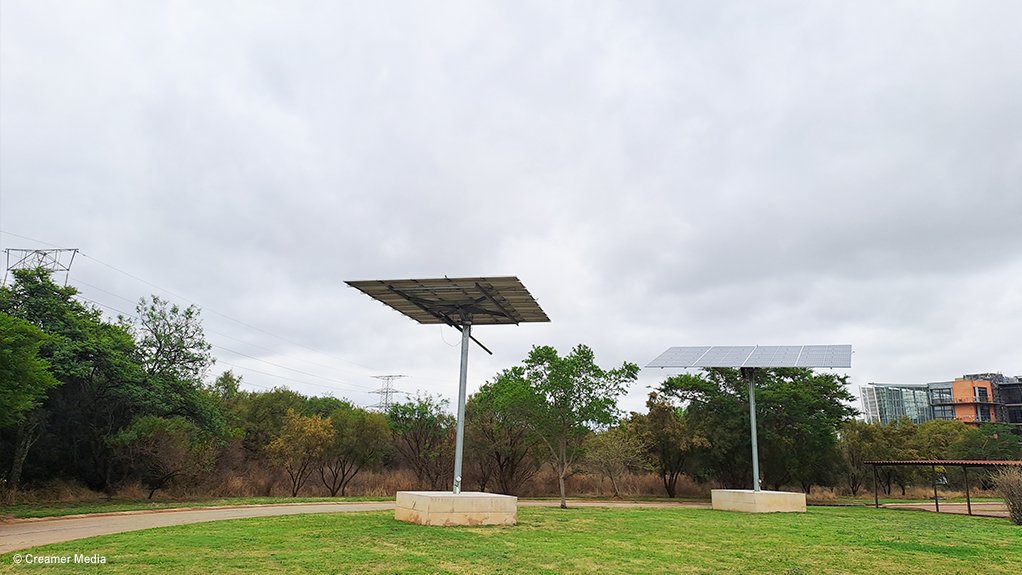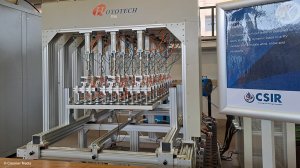CSIR solar PV testing lab ensuring quality standards for industry



A mechanical load tester at the lab
Photo by Creamer Media's Tasneem Bulbulia
Solar PV systems at the CSIR's campus
Photo by Creamer Media's Tasneem Bulbulia
The Council for Scientific and Industrial Research’s (CSIR’s) solar photovoltaic (PV) module testing laboratory, built on site at its campus, in Pretoria, boasts equipment, expertise and capacity to undertake accelerated reliability stress testing on PV modules to ensure their quality and reliability.
The South African National Accreditation System-accredited lab is able to undertake 16 testing methods.
This ensures that only high-quality modules that are suitable to different regions’ climates are developed and installed and that the modules perform optimally for the duration of their lifespan.
Speaking to Engineering News during a tour of the facility on November 3, PV testing technologist Siyasanga Innocent May said the lab, which is a pioneer in Southern Africa, conducts testing for a variety of clients, with modules originating from both local and international locations.
The lab is able to conduct testing on most of the common PV technologies, including crystalline, thin film, high capacitance and bifacial modules.
The lab was commissioned in a phased approach, beginning in 2018, May explained.
The CSIR’s accelerated stress tests provide quantitative metrics for evaluating the performance and reliability of solar PV modules over time.
The tests are said to accelerate the failures in poorly manufactured modules that can otherwise take years to occur naturally in the field, thereby helping to ensure reliable solar PV plant performance.
Among the 16 testing methods, environmental and mechanical stress testing form the foundation for the pre-qualification of new concepts, certification of new PV modules and reliability testing of existing PV technology.
The PV module quality and reliability testing services are designed around specialised equipment for PV module extended reliability. The specialised equipment includes environmental chambers to simulate the real-world environmental conditions.
This includes thermal cycling of modules to simulate stress from thermal expansion and contraction.
Moreover, there is humidity freeze testing, to stress the lamination and adhesion strength of the PV module.
There is also damp heat testing, with and without electrical bias to stress the adhesion and insulation of the PV module.
Further, there is mechanical load testing: static and dynamic load for simulating transportation, installation, and wind loads that may lead to broken cells and weakened interconnections.
The lab also operates specialised characterisation equipment to measure the electrical performance and safety aspects of the PV module. Its sun simulator outputs an equivalent dose of energy nearly identical to the sun’s energy and spectrum, but only for a fraction of a second.
The sun simulator is used to compare the output of the PV module as measured at the factory against an independent standard. It also quantifies the impact of the accelerated stress tests alluded to earlier.
Lastly, the high-potential electrical tester helps to identify failures in the insulation resulting from accelerated stresses. Failures in electrical insulation indicate a potential risk to the safe and reliable performance of PV modules over time.
The PV team at the CSIR also offers outdoor test services for module-level performance testing, soiling studies, degradation studies and small-scale string inverter system testing in a real-world environment.
May mentioned that, with the ramp up of technology in the solar PV industry, the lab has had to keep abreast of this, upgrading its infrastructure to meet this, including a plan to upsize its equipment to test bigger modules that are entering the market.
Meanwhile, the CSIR has also built an array of solar PV plants around its campus in Pretoria.
The power that is generated from these feeds directly into the CSIR’s campus grid, and therefore, some of it is used to power the solar PV testing lab.
The module array is controlled by a ground-mounted single-axis solar tracker that allows the modules to tilt and follow the movement of the sun from east to west.
While this tracking system is said to be more expensive to install and maintain, it engenders a higher energy yield than a fixed-tilt system.
In total, the CSIR has about 2 MW of installed solar PV capacity, providing about 15% of the campus’ electricity needs.
Article Enquiry
Email Article
Save Article
Feedback
To advertise email advertising@creamermedia.co.za or click here
Announcements
What's On
Subscribe to improve your user experience...
Option 1 (equivalent of R125 a month):
Receive a weekly copy of Creamer Media's Engineering News & Mining Weekly magazine
(print copy for those in South Africa and e-magazine for those outside of South Africa)
Receive daily email newsletters
Access to full search results
Access archive of magazine back copies
Access to Projects in Progress
Access to ONE Research Report of your choice in PDF format
Option 2 (equivalent of R375 a month):
All benefits from Option 1
PLUS
Access to Creamer Media's Research Channel Africa for ALL Research Reports, in PDF format, on various industrial and mining sectors
including Electricity; Water; Energy Transition; Hydrogen; Roads, Rail and Ports; Coal; Gold; Platinum; Battery Metals; etc.
Already a subscriber?
Forgotten your password?
Receive weekly copy of Creamer Media's Engineering News & Mining Weekly magazine (print copy for those in South Africa and e-magazine for those outside of South Africa)
➕
Recieve daily email newsletters
➕
Access to full search results
➕
Access archive of magazine back copies
➕
Access to Projects in Progress
➕
Access to ONE Research Report of your choice in PDF format
RESEARCH CHANNEL AFRICA
R4500 (equivalent of R375 a month)
SUBSCRIBEAll benefits from Option 1
➕
Access to Creamer Media's Research Channel Africa for ALL Research Reports on various industrial and mining sectors, in PDF format, including on:
Electricity
➕
Water
➕
Energy Transition
➕
Hydrogen
➕
Roads, Rail and Ports
➕
Coal
➕
Gold
➕
Platinum
➕
Battery Metals
➕
etc.
Receive all benefits from Option 1 or Option 2 delivered to numerous people at your company
➕
Multiple User names and Passwords for simultaneous log-ins
➕
Intranet integration access to all in your organisation



















